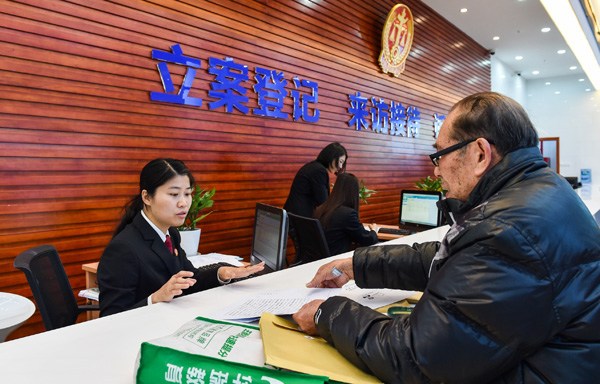
A litigant files a case with the Supreme People's Court's First Circuit Court in Shenzhen, Guangdong province. (Photo/Xinhua)
Two-way discussions
According to Huang, because judges from the top court visit litigants' home districts to resolve disputes, the legal process has become smoother. "We can also provide legal opinions for the circuit court in person. In the past, it was difficult to meet judges from the highest chamber, let alone communicate with them, but now face-to-face talks are a reality."
Since it was established, the circuit court in Shenzhen has regularly invited legal specialists, lawyers and law professors to visit and interact with local legal officials.
"That happened at least three times last year. It allows the judges to analyze new judicial interpretations on our behalf and allows us to share questions which may arise while we handle disputes," Huang added.
Chen Yang, a lawyer who was involved in a case heard by the Third Circuit Court in January, has experienced the improved efficiency resulting from the dual-track system.
"My client had a dispute about a contract. We were dismayed to discover that there would be a gap of 680 days between filing the case in Beijing and the first hearing," she said. "However, when we decided to appeal to the top court, the third branch had just opened in Nanjing, and within two weeks, our case had been heard and the appeal was accepted."
"What's more, the second trial opened one month later," she added. "If the circuit court hadn't existed, I would have had to spend at least two days in Beijing for the trial. This time, though, the trial only took about 20 minutes in Jiangsu."
Huang said that before the new courts were established, litigants often complained about having to make repeated, time-consuming visits to Beijing to attend hearings at the Supreme People's Court. They were also unhappy about the length of time it took to reach verdicts. "I believe the six branches will reduce the number of complaints and make people feel that justice can be dispensed more quickly," he said.
Preventing corruption
The heads of the four new circuit courts are vice-presidents of the top court, while 11 of the country's 36 chief judges hold doctorates in law, according to a statement from the Supreme People's Court.
Senior judges from the top court have been dispatched to the branches. "However, we're also keen to recruit new staff at lower levels," said Xu, from the Supreme People's Court's political department.
Last month, the circuit courts in Nanjing and Zhengzhou advertised jobs on the top court's website, offering positions for clerks, legal officers for administrative affairs and as general staff in legal centers, providing the applicants pass the relevant exams.
"All the judges dispatched by the top court will work in rotation to prevent judicial corruption, which may sometimes result from long-term stays at the branches," he added.
However, Shi Pengpeng, a law professor at the China University of Political Science and Law, said preventing official interference in hearings is not just a job for the courts: "It will also require the combined efforts of a large number of departments, and a reliable supervision system."


















































